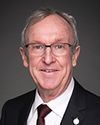It's interesting. Sometimes it's hard to pinpoint where money is coming from for some of these friendship centre programs that do language learning. I just happen to be very close with the executive director from Native Montréal. He does over five indigenous languages with $100,000. Can you imagine a university delivering a language program, or a portion of one, for $100,000? That expectation would never be put on somebody, but Native Montréal works extremely hard to find five different indigenous language instructors to be available every week.
They moved into a new space and it wasn't enough space for their language classes. You can imagine that expecting anyone to do that for $100,000 is not really respecting indigenous languages.




